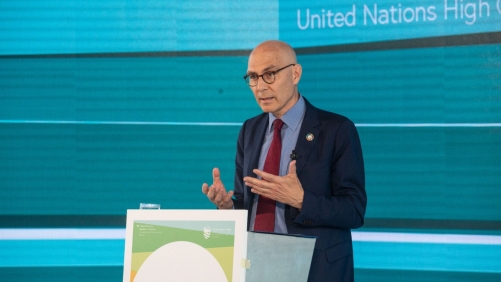UN High Commissioner for Human Rights Volker Türk Warns Against Unregulated Online Hate Speech
TDT | Manama
Email : editor@newsofbahrain.com
In a statement that has raised concerns about the future of online discourse, United Nations High Commissioner for Human Rights Volker Türk has warned that the recent content moderation policy changes by Meta could lead to a surge in harmful content across social media platforms, with serious repercussions for freedom of expression.
Meta's decision to overhaul its automated content moderation, limiting its scope to "high-severity violations" such as terrorism-related content, is part of a broader trend among major social media companies, including Telegram and X (formerly Twitter). While these changes are presented as measures to protect free speech, Türk argues that they could significantly harm marginalized communities, including LGBTIQ+ individuals, refugees, migrants, and minorities. By permitting more abusive and hate-filled content, these platforms risk silencing these groups and further isolating them, thus limiting their access to a vital space for expressing their views.
“This policy shift could seriously undermine freedom of expression, not just for affected communities, but for everyone,” said Türk. “Social media platforms play a critical role in information exchange, but poorly regulated spaces can distort public debate and fracture societies."
Türk further emphasized the broader dangers of unmoderated content, particularly during times of conflict, crisis, or election periods, where disinformation and hate speech can fuel violence and social unrest. He recalled his recent visit to Syria, where he witnessed the dangerous impact of disinformation.
The UN High Commissioner pointed out that social media platforms have previously been called to account for their role in spreading hate speech and inciting violence. In 2018, Facebook acknowledged its failure to prevent the dissemination of hate and violence against the Rohingya population in Myanmar. Similarly, during recent election campaigns in countries like Brazil, Kenya, and Moldova, disinformation has been linked to the destabilization of democratic processes.
Türk stressed the importance of human rights due diligence and called on both social media companies and states to ensure that online spaces remain open and free for all. While acknowledging the difficulties of content moderation, he argued that regulating online hate speech is not censorship but a necessary safeguard for maintaining information integrity in the digital age.
"Human rights law provides a framework for managing these challenges," Türk stated. "It is universal, dynamic, and adaptable to new issues. Protecting freedom of expression and preventing incitement to hatred and violence are not mutually exclusive."
The High Commissioner concluded by advocating for transparency, accountability, and the right to challenge content moderation decisions. The regulation of online content, he asserted, must consider the context, local language nuances, and the broader information environment.
"Effective content governance can only emerge through open, informed, and ongoing discussions across society,” Türk emphasized. "Human rights law should be our guiding principle to protect public discourse, build trust, and defend the dignity of all."
Related Posts

